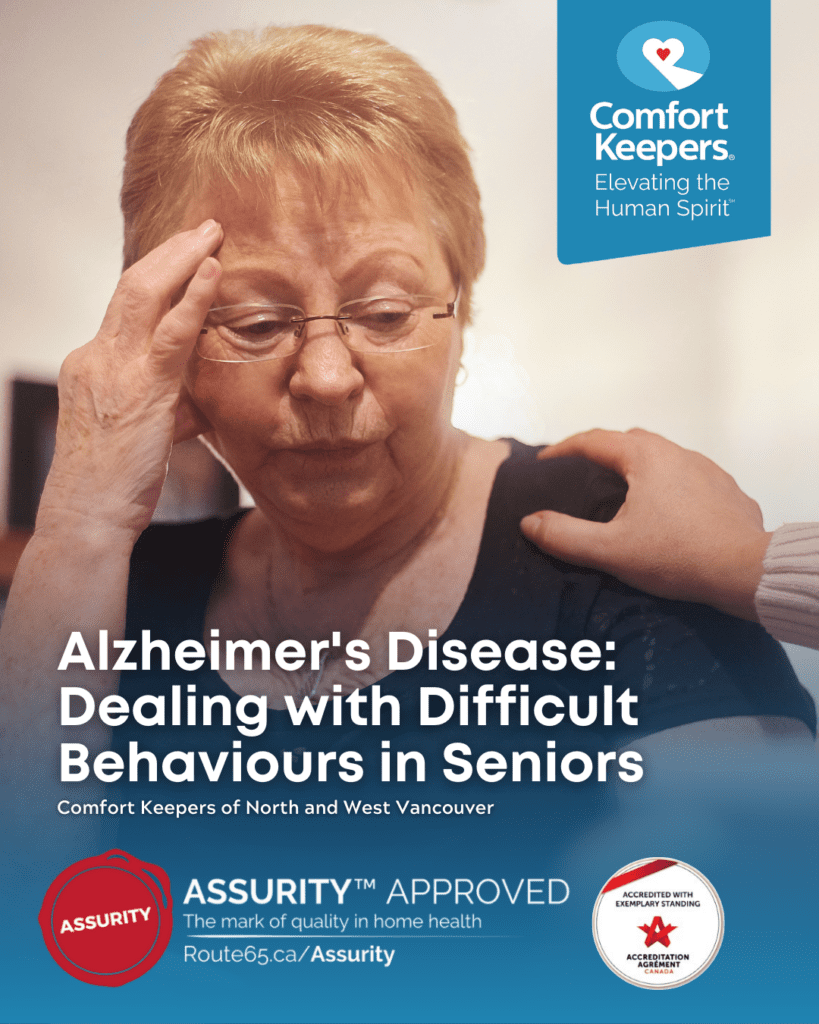Alzheimer’s Disease: Dealing with Difficult Behaviours in Seniors
Seniors and Alzheimers | November 13, 2020

What Every Senior and Caregiver Needs to Know About Dealing with Difficult Alzheimer’s Behaviour
Alzheimer’s Disease | Caring for a loved one can be a rewarding experience, but it’s not without challenges. These challenges can be significantly more impactful for those caring for a senior with Alzheimer’s disease or other form of dementia. Changes in behaviours can occur for a variety of reasons, including over-stimulation, physical discomfort, confusion, exhaustion caused by sleep problems, medication, or changes in routine.
Understanding the cause of behavioural changes is critical for caregivers, families and friends. And, it’s helpful for caregivers to know how to manage behaviours that will allow them to provide safe and effective support and diffuse tense situations.
Seniors with Alzheimer’s and Difficult Behavior Examples:
- Depression
- Anxiety
- Confusion
- Aggression or anger
- Suspicion
- Hallucinations
- Pacing or wandering
The most important thing that caregivers need to remember is that challenging behaviours may not be entirely avoidable. It’s also not the fault of the person with Alzheimer’s or dementia. These behaviours are sometimes a common product of the disease. And, there is specialized support a caregiver can use to help keep a challenging behaviour from escalating.
Alzheimer’s Disease: Tips for Dealing with Difficult Behavior
While there is no guaranteed approach that will work with every person or situation, there are some methods that can help caregivers manage trying times:
Tip #1 – Staying calm:
It’s not uncommon for caregivers to feel attacked or helpless when they are caring for someone exhibiting difficult behaviours. Remembering that it isn’t personal and that it’s a symptom of the disease, can help caregivers manage their emotions and avoid contributing to tense or difficult situations. Arguing or reasoning can often escalate an outburst, so caregivers must stay calm and supportive
Tip #2 – Keeping a schedule:
Seniors who suffer from Alzheimer’s disease and other dementias often find it reassuring to have a set schedule for meals, activities and daily tasks. Creating a schedule, and sticking to it as much as possible, can help prevent anxiety, confusion and anger.
Tip #3 – Exercise:
Exercise, with approval from a physician, is a great stress reliever for both seniors and caregivers. And, participating in activities together helps foster important emotional connections.
Tip #4 – Participating in activities:
Whether it’s an enjoyable hobby, household chore or physician-approved exercise, participating in joyful activities has been shown to help manage challenging behaviours. These can be pre-scheduled or introduced when difficult behaviours are recognized. For example, caregivers can ask for help folding laundry to ease anxiety or can play music or sing to calm someone feeling confused, angry or depressed.
Tip #5 – Mindful communication:
Caregivers shouldn’t underestimate the power of communication. Caregivers can use soothing tones, speak in a friendly way and make eye contact to convey normalcy, understanding and compassion. This can help seniors experiencing anxiety or frustration to calm themselves.
The Best Senior Home Assistance Care in North and West Vancouver is Comfort Keepers®
Our senior home care agency offers in-home care focusing on aging in place. Our services include dementia care, end-of-life care, post-surgery care, and palliative care. Comfort Keepers can assist seniors with living transition services, personal care, companionship care, and more!
Quality and Accredited Elderly Care: Happier, Healthier, and at Home with 24/7 Senior Care Opportunities!
Do you need a home care solution for yourself or a loved one? Have you been thinking about retirement homes and their alternatives as a solution? Comfort Keepers® enables seniors to maintain happy, healthy lives in the comfort of their own homes. In-home care services are available in North Vancouver, West Vancouver, and the surrounding areas.
Comfort Keepers® is a Senior Care Agency That Can Make a Difference with Interactive Caregiving™
Our in-home caregivers ensure our senior clients have the best quality of life. The Interactive Caregiving™ program ensures that a senior’s safety, nutrition, mental well-being, and everyday needs are met. This program brings joy and good health to each client’s home.
Comfort Keepers® North Vancouver and West Vancouver Can Help with In-Home Elderly Care Services!
If you are concerned about the health and well-being of a loved one we can help! Comfort Keepers offers 24-hour care and delivers top-quality and compassionate care for seniors. We are dedicated to safety technology solutions that foster independence and enhance well-being.
Locally Owned and Operated Home Health Care Agency
Our care centers around companionship for seniors. Empathetic care originates from the soul and allows us to meet our client’s requirements. The seasoned in-home caregivers employed by Comfort Keepers are carefully chosen based on their empathetic qualities.
Contact the Comfort Keepers® North Vancouver and West Vancouver office at (604) 998-8806 to learn more about our unique in-home care solutions for seniors.
Comfort Keepers is an Accredited Senior Care Agency in North and West Vancouver, BC
Accreditation is a rigorous process that involves industry experts evaluating an organization’s processes, policies, and procedures. Comfort Keepers® North and West Vancouver has been awarded Exemplary Standing by Accreditation Canada. This achievement recognizes that Comfort Keepers® meets or exceeds the stringent quality standards for Home Care companies established by Accreditation Canada.
References
alz.org Canada. “Alzheimer’s and Dementia in Canada”. Web. 2019.
National Institute on Aging. “Managing Personality and Behavior Changes in Alzheimer’s.” Web. 2017.
Verywell Health. “Complete Guide to Challenging Behaviors in Dementia.” Web. 2019.
Alzheimer’s Association. “Stages and Behaviors.” Web.
Individualized Home Care Options
Long-Term Home Care, 24 Hour Home Care & Short Term Care Options Customized for You





